

Surfaces of Revolution. Nicholas of Cusa and the Making of the Early Modern World - Google Books. Philolaus. 1.
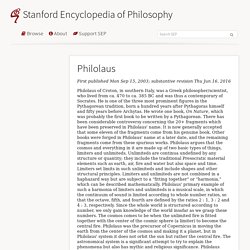
Life and Writings 1.1 Date, City of Origin and Connections to Other Philosophers We know very little about Philolaus' life. Only one brief and not very reliable ancient life of Philolaus survives, that of Diogenes Laertius (VIII 84–5). Diogenes includes Philolaus among the Pythagoreans; indeed he is, in fact, one of the three most important figures in the ancient Pythagorean tradition, along with Pythagoras himself and Archytas. Diogenes Laertius says that Philolaus was from the Greek city of Croton in southern Italy, but our earliest sources are divided as to his city or origin.
The ancient tradition gives no indication of who Philolaus' teacher(s) might have been. 1.2 The Authenticity Question In the case of most ancient authors, the assumption is that a text handed down in their name is genuine, unless strong reasons can be given for regarding it as a forgery. 1.3 Philolaus' Book: Genuine Fragments and Testimonia 1.4 Spurious Fragments and Testimonia 2. 2.1 Limiters and Unlimiteds 3. PDF. Pythagoras. 1.
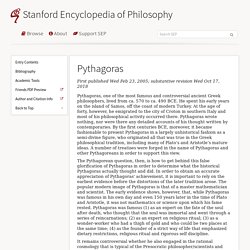
The Pythagorean Question What were the beliefs and practices of the historical Pythagoras? This apparently simple question has become the daunting Pythagorean question for several reasons. First, Pythagoras himself wrote nothing, so our knowledge of Pythagoras’ views is entirely derived from the reports of others. Second, there was no extensive or authoritative contemporary account of Pythagoras. 2. 2.1 Chronological Chart of Sources for Pythagoras 2.2 Post-Aristotelian Sources for Pythagoras. WikiGallery.org, the largest gallery in the world. Iamblichus' Life of Pythagoras, or Pythagoric Life. Approach ye genuine philosophic few, The Pythagoric Life belongs to you: But far, far off ye vulgar herd profane; For Wisdom’s voice is heard by you in vain: And you, Mind’s lowest link, and darksome end, Good Rulers, Customs, Laws, alone can mend.
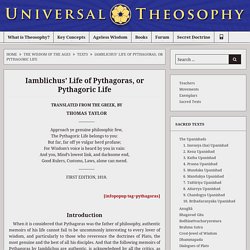
[infopopup tag=pythagoras] Introduction When it is considered that Pythagoras was the father of philosophy, authentic memoirs of his life cannot fail to be uncommonly interesting to every lover of wisdom, and particularly to those who reverence the doctrines of Plato, the most genuine and the best of all his disciples. And that the following memoirs of Pythagoras by Iamblichus are authentic, is acknowledged by all the critics, as they are for the most part obviously derived from sources of very high antiquity; and where the sources are unknown, there is every reason to believe, from the great worth and respectability of the biographer, that the information is perfectly accurate and true. Chapter I. Chapter II. Chapter. Chapter IV. Chapter. PDF. Article 31: Number – The Triad – Part 5 – Triangles – Part 3 - Cosmic Core.
Return to Free Library Return to Number Menu Previous Article Next Article This article will round out our discussion of triangles by discussing Golden and Pythagorean triangles.
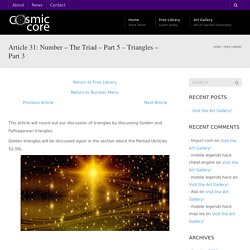
Golden triangles will be discussed again in the section about the Pentad (Articles 52-59). A golden triangle, or sublime triangle, is an isosceles triangle in which the duplicated side is in the golden ratio to the distinct side. In the case below, the ratio a:b is equivalent to the golden ratio φ. This means if b = 1 then a = 1.618… Also, b:a :: a: (a+b) The golden triangle is also the shape of the triangles found in the points of pentagrams. The golden triangle can also be found in a decagon (10-sided polygon) by connecting any two adjacent vertices to the center. Fragments of Heraclitus. Layout 1 Contents[edit] 1 2 3 4 5 6 7 8 9 10 11 12 13 14 15 16 17 18 19 20 21 22 23 24 25 26 27 28 29 30 31 32 33 34 35 36 37 38 39 40 41 42 43 44 45 46 47 48 49 49a 50 51 52 53 54 55 56 57 58 59 60 61 62 63 64 65 66 67 67a 68 69 70 71 72 73 74 75 76 77 78 79 80 81 82-83 84 85 86 87 88 89 90 91 92 93 94 95 96 97 98 99 100 101 101a 102 103 104 105 106 107 108 109 110-111 112 113 114 115 116 117 118 119 120 121 122 123 124 125 126 127 128 129 Fragment 1[edit] (2) Though this Word[1] is true evermore, yet men are as unable to understand it when they hear it for the first time as before they have heard it at all.
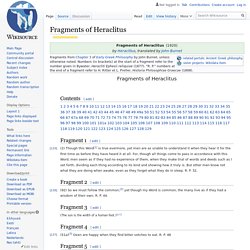
For, though all things come to pass in accordance with this Word, men seem as if they had no experience of them, when they make trial of words and deeds such as I set forth, dividing each thing according to its kind and showing how it truly is. Fragment 2[edit] (92) So we must follow the common,[2] yet though my Word is common, the many live as if they had a wisdom of their own. [edit] Atlantis: the antediluvian world : Donnelly, Ignatius, 1831-1901.